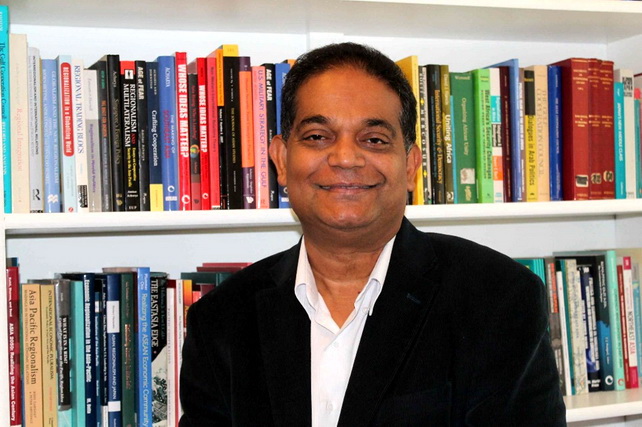
Amitav Acharya: Central Asia Should Rely on Its Own Identity and Regional Autonomy
Amitav Acharya: Central Asia Should Rely on Its Own Identity and Regional Autonomy
Tashkent, Uzbekistan (UzDaily.com) — Central Asia should rely on its own identity and regional autonomy. This view was expressed by renowned scholar of regionalism Amitav Acharya in his address to participants of the 8th Central Asian Expert Forum (CAEF), held in Tashkent on 14–15 August 2025.
Amitav Acharya is a professor at American University in Washington, a leading researcher in international relations and regionalism. His seminal works, which have earned wide recognition in the academic community and are among the most cited scholarly publications, include The Making of Southeast Asia: International Relations of a Region and The End of American World Order. He is the founder of the Association of Asian Political and International Studies and a former president of the International Studies Association (ISA) in the United States.
In his speech, the scholar, analyzing regionalism processes in Central Asia, urged the countries of the region to draw lessons from ASEAN’s model of regionalism.
According to Acharya, “regions are what they make of themselves.” In his words, “geographic proximity or cultural similarity alone do not create regional identity. It must be shaped through interaction and regional mechanisms of cooperation.”
As an example, he cited the Association of Southeast Asian Nations (ASEAN). “ASEAN represents a region of enormous cultural, civilizational, religious, and developmental diversity. Yet the Association managed to play an important role in shaping regional identity,” Acharya noted.
He emphasized that “ASEAN operated through its own institutions and through a distinctive ‘ASEAN Way’—an approach based on the peaceful settlement of disputes and conflicts.”
In his view, ASEAN’s experience offers two key lessons that are particularly relevant for Central Asia.
The first is not to take sides in the rivalry of great powers and to maintain so-called regional autonomy. “In ASEAN’s context, this is known as the principle of centrality: even while engaging actively with external powers, the region maintains its own agenda and does not simply follow external directives,” he explained.
The second is that Central Asian states must avoid becoming entangled in geopolitical confrontations among major powers. “It is essential to develop the centrality of Central Asia and preserve the autonomy of the region’s states. This does not mean conflict or rejecting cooperation with external powers. Rather, it means creating a platform where actors such as Russia, China, and India can cooperate—but on an agenda defined by Central Asian states themselves,” Acharya stressed.
Another important factor in safeguarding regional identity, he noted, is the ability to manage internal conflicts. “Disputes, disagreements, and competition between countries will always exist for various political, ideological, or other reasons. But the key is to prevent these disputes from escalating into open hostility or war, which could undermine regional cohesion and unity. This can be achieved through norms, institutions, and conflict-resolution mechanisms,” he argued.
Acharya also emphasized that “regional identity is not something given. It must be consciously built and sustained. This requires preserving autonomy, refraining from involvement in great power conflicts, and independently shaping the agenda of regional cooperation.”
“This is what I call the centrality of Central Asia. Such centrality is only possible if unity among the countries of the region is maintained. Then we can speak of a strong regional identity and a resilient regionalism,” he said.
He concluded that “in a multiplex world order, regions will play an increasingly important role. But for them to become truly effective and meaningful, they must exercise agency—acting on the basis of their own autonomy and identity,” the political scientist summarized.
The CAEF was organized by the Institute for Strategic and Interregional Studies (ISMI) in partnership with the UN Regional Centre for Preventive Diplomacy for Central Asia, the EU Delegation, the OSCE, and the Konrad Adenauer Foundation in Uzbekistan.
For the first time, the forum brought into its expert dialogue leading specialists from the EU, ASEAN, the Nordic Council, as well as scholars from Russia, the United States, the United Kingdom, Germany, Switzerland, Azerbaijan, and other countries.